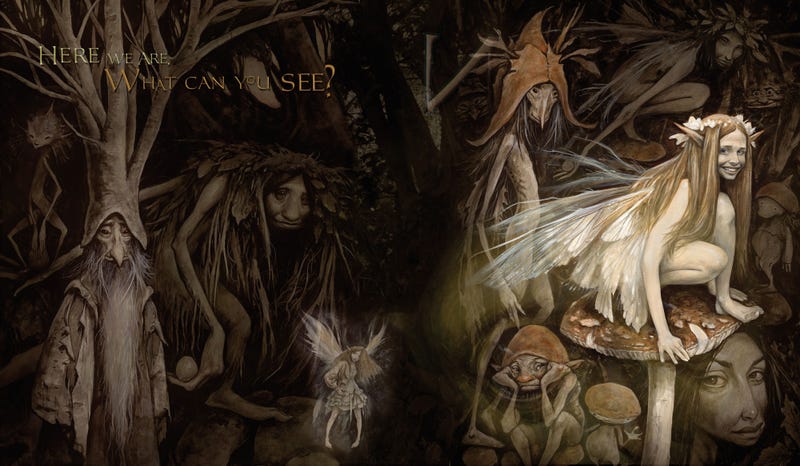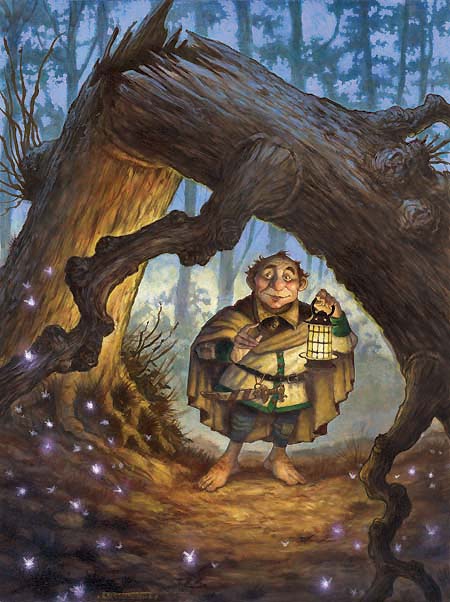---
Travel in the Underworld is measured in “watches.” A watch isn't
a concrete period of time—it can be an hour or ten minutes or all night. It’s
hard to tell how much time is actually passing in the Underworld. Time moves
weirdly—happy moments burn away quickly, whereas tense moments stretch like
lengthening shadows. Watches are just a way to talk about how quickly, quietly,
and carefully you're moving.
When a watch passes, the GM draws a card from the major arcana
and compares the result against a watch table appropriate to that area.
A watch passes when:
·
The Guild passes into a new region on the map
·
The Guild spends an inordinate amount of time
performing a task (e.g., digging a trench, smashing down a door, etc.)
If the region travelled into is a “special hex,” (i.e., a planned
encounter) the guild will encounter the random watch event in the context of
the special hex. For example, if the hex travelled into hosts a dragon’s lair
and the GM randomly pulls a patrol of goblins, the goblins might be attempting
to sneak into the dragon’s lair for treasure—and making entirely too much noise
in the process.
The Meatgrinder Table
Play happens by a combination of questions the GM asks the
players and the decisions they make. It’s not a preplanned story.
The Meatgrinder represents the unpredictability of play. Every
time the guild moves a hex, the GM should check on the Meatgrinder table to see
what is currently happening to or around the guild. Every time the group enters
into a new area, the GM draws on the meatgrinder table to find out what they
encounter there. If there is a special hex, the GM interprets the result of the
meatgrinder through that lens.
In general, meatgrinder tables follow this formula:
Torches gutter (I-V): When torches gutter, the
players mark off one use of any active light source. Candles have two uses,
torches have three, and lamps have four. Torches guttering represents time
passing as your light sources grow dim.
Not every environment will be appropriate for this event. For example, the guild might be exploring a cave lit with glowing moss and mushrooms, or an underground castle lit with ghostly green torches.
Not every environment will be appropriate for this event. For example, the guild might be exploring a cave lit with glowing moss and mushrooms, or an underground castle lit with ghostly green torches.
Curiosities (VI-X): Curiosities are moments of
serendipity. “Nothing happens” is a boring result for a random table. A curious
occurrence is an opportunity for a GM to interject color into the lightless
depths of the Underworld. Curiosities are probably not worthy of an entire
scene of narration, so they might be seen as “nothing happens,” but they can
also be inspiration for role-playing exchanges or provide hints about the local
environment.
Travel events (XI-XV):
Travel events are like curiosities but have more meaning or
mechanical weight. Travel events are often things that go wrong during the
journey. They might require an adventurer to make a hard choice about resource
management or ask them to test one of their attributes to avoid a hardship.
Travel events might prompt an Encounter.
Random encounters (XVI-XX):
Random encounters are chance meetings with the denizens of
the dungeon. These might be friendly encounters with would-be allies,
encounters with hungry animals, or encounters with murderous monsters.
Interesting random encounters don’t simply list “monster type.” The best random
encounters paint a small scenario, which the GM can use as inspiration mid-game
for an Encounter.
Quest rumor (XXI): Quest
rumors lead the adventurers closer to the current quest they are pursuing.
They hear whispers, see signs, and obliquely brush against their quest.
If they have already made significant progress on their current quest by actively seeking rumors in taverns and having a few near misses with their quarry, this might even be a random encounter that features the object of their quest.
If they have already made significant progress on their current quest by actively seeking rumors in taverns and having a few near misses with their quarry, this might even be a random encounter that features the object of their quest.
A meatgrinder table might look something like this:
I.
Torches gutter
II.
Torches gutter
III.
Torches gutter
IV.
Torches gutter
V.
Torches gutter
VI.
Curiosity: The guild startles up a [pack of
albino rats/flock of luminescent cave butterflies]. They scurry away quickly.
VII.
Curiosity: The guild hears a wolf’s keening howl
distantly.
VIII.
Curiosity: The first person in the marching
order notices some graffiti chalked onto the cavern wall. It reads: “Ulf is no
true orc. If he wishes to win my hand in marriage, he must defeat me in
combat.” (The GM can accept Lore Bids on this curiosity as appropriate.)
IX.
Curiosity: The guild wanders by a shallow pool.
The water looks clear, but the pool is full of toothy, blind fish.
X.
Curiosity: The air is full of a heady floral
scent. If the guild searches around a little, they’ll find a bunch of pale blue
and purple lilies sprouting nearby. Appropriate Lore Bids will show that they
are normal flowers with few (if any) meaningful alchemical properties, but they
are quite lovely and might make a nice bouquet for someone.
XI.
Travel event: The last person in the
marching order accidentally steps in some droppings. If they can’t find a way
to get clean soon, they’ll become Stressed.
If the guild investigates, they realize that the droppings are [the fewmets of a dragon/the pellet of an owlbear]. It looks no more than a day old.
If the guild investigates, they realize that the droppings are [the fewmets of a dragon/the pellet of an owlbear]. It looks no more than a day old.
XII.
Travel event: The guild encounters a rushing
river which has risen past its banks. It’s impossible to ford without getting
soaked. The guild can either turn back and try and find an alternate route or
attempt to cross. Swimming across the river requires a test of Swords. If
successful, they make it across safely. If the test fails, they suffer a Wound
from almost drowning. Whether successful or not successful, anybody who braved
the cold waters becomes Stressed. If no precautions were taken, fragile items
in backpacks (scrolls, provisions) are soaked and ruined.
XIII.
Travel event: While travelling, a random player
hero discovers that their pack has a hole in it. The last listed item in their
pack has fallen out and disappeared. (Backtracking and performing a thorough
search will prompt additional watches to pass.)
XIV.
Travel event: The guild comes upon a field of
faintly glowing green mushrooms sporadically sending up little clouds of dust.
In the middle of the field is a corpse in rusted armor. A cracked chest lies
near the corpse. (It’s all bad news. Mushrooms are poisonous. Corpse is a
ghoul. Chest? Probably bad too. But there’s also gold in the chest and that’s
good.)
XV.
Travel event: The guild’s path forward is
blocked by thick layers of web. A path forward will be laborious and will
prompt a random encounter draw. If the draw is XV-XXI, some giant spiders will
show up. However, the guild can see several hanging sacks dangling from the
cavern ceiling. Are these other adventurers who met a grim fate? Could they be
rescued?
XVI.
Random Encounter: The guild happens upon a
squat but cozy-looking tavern. A wooden sign depicts a red fish leaping from
the water (a herring, if anybody bids lore). Inside is a tapped barrel of ale
and a cauldron full of stew, but no innkeeper to be seen. In fact, the tavern
is a giant mimic occupied by several smaller mimics. Sleeping in the mimic
tavern is a notably bad idea.
XVII.
Random Encounter: A cockatrice has taken its
chicks out to teach them how to hunt.
XVIII.
Random Encounter: An amorous ogre is trying
impress a she-ogre with increasingly ridiculous feats of strength. They are
both making a terrible racket.
XIX.
Random Encounter: A gang of three orc youths
accompanied by a random number of goblins are on a quest to make a name for
themselves before returning to their tribes. They might see the player’s guild
as an appropriate challenge, or join with the guild against some greater foe.
XX.
Random Encounter: An owlbear has treed Gentle
Simon of Heartsbane, a notoriously shrimpy sorcerer. All of Gentle Simon’s
spells have been expended trying to rescue himself, and he’s now beginning to
weep.
XXI.
Quest Rumor: The adventurers find a rival
adventuring party crucified. They are still alive, though grievously injured
and dehydrated. If the adventurers can provide aid, healing, and food, the
rival party gasps about their recent encounter with the vampire Geralt Mourn,
who the guild has sworn to slay. It was this dread vampire who crucified them
as a warning to others. They have news of his current whereabouts, but would be
loath to tangle with him again.
When a watch event is triggered, the GM should mark it off. If the
cards are shuffled and the GM draws the same event twice, nothing happens and
the guild has a bit of respite. Meatgrinder tables are repopulated by the GM
after the Guild returns to the City.
Wandering Monster Checks
Every time the Guild makes a very
loud noise or otherwise draws attention to themselves, the GM draws on the Meatgrinder
table for a random encounter. If the card drawn indicates a random encounter,
the indicated creature will be drawn to investigate the guild’s noise.
Light Checks and Moving Carefully
If the Guild is proceeding slowly or methodically, tapping in
front of them with their ten-foot pole, the GM should pull on the Meatgrinder table after resolving the potential encounter. If the second draw is
"torches gutter," the GM keeps the result, to represent additional time
passing. If the second draw is 6 or higher, ignore it.



